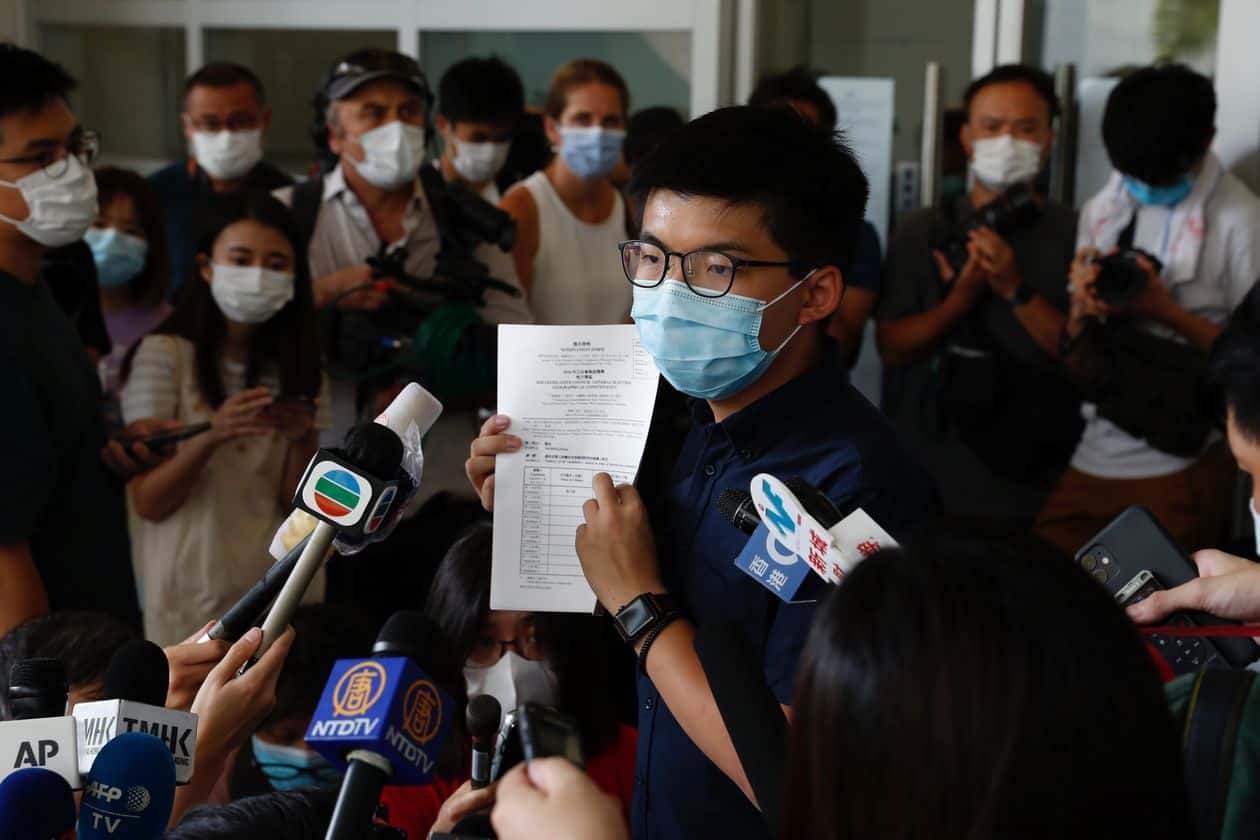Pro-Democracy Candidates Barred From Hong Kong Election

Authorities banned 12 opposition candidates from running in planned legislative elections, as they moved to further dismantle a pro-democracy movement that challenges China’s rule in the city.
Candidates across the democratic spectrum—including more moderate incumbent lawmakers, grass-roots activists and internationally known advocates—were informed Thursday that their candidacies for the citywide vote planned for Sept. 6 were invalid. The scale of disqualifications and reasoning provided was widely condemned by the opposition camp as political censorship.
Among reasons Hong Kong election officials cited were statements that the candidates had made about opposing government policies in the legislature and doubts over their allegiance to the city and its mini-constitution, known as the Basic Law. Among the disqualified candidates were Joshua Wong, a prominent activist, and members of the pro-democracy Civic Party.
Democratic groups aim to take control of the 70-seat legislature following a year of antigovernment protests and after sweeping national security laws imposed in June many say threaten their civil liberties. A majority would give opposition groups power to disrupt or vote down government proposals.
The disqualifications come amid growing concerns that the election will be postponed amid the city’s biggest outbreak of coronavirus cases and a tense political climate since Beijing imposed the laws.
Foreign governments including the U.S. and the U.K. have warned of a further threat to the city’s autonomy if the vote was postponed. Human rights groups and foreign politicians, who have in recent days said they would be watching the election closely, condemned the disqualifications.
“This is an outrageous political purge of Hong Kong’s democrats,” Chris Patten, the last British governor of Hong Kong and a vocal critic of China’s increasing control of the city, said in a statement. “It is obviously now illegal to believe in democracy.”
Beijing had broken its promise in a handover agreement between the two nations that the city would remain unchanged until 2047, Mr. Patten said.
The Hong Kong government said that election officers had a duty to ensure nominees complied with requirements to declare they uphold the Basic Law and pledge their allegiance to the city, a special administrative region of China. More disqualifications could follow, it added.
“There is no question of any political censorship, restriction of the freedom of speech or deprivation of the right to stand for elections as alleged by some members of the community,” the government said Thursday.
The move follows other actions to exert political pressure across different corners of society. On Tuesday, a partly-government appointed council fired a Hong Kong law professor who is appealing his conviction on public nuisance offenses for his role in organizing democracy protests in 2014. On Wednesday, police said they had arrested four students for social media posts advocating independence for the city.
Beijing’s new national security laws outlaw secessionist activities as well as terrorism, sedition and colluding with foreign forces to interfere with national security.
By Thursday night, 150 nomination forms were submitted for the 70-seat Legislative Council, as the city’s lawmaking body is known. Half of the seats are decided by direct election, while the others are distributed among various business and social constituencies that pick their own candidates. A fully democratically elected legislature was among the five demands of protests that rocked the city last year. The nomination period ends Friday.
The candidates disqualified Thursday include Mr. Wong, who has been a vocal advocate internationally for the city’s pro-democracy movement, and Gwyneth Ho, a former journalist. Both were front-runners in an unofficial primary held by the democratic camp earlier this month, which attracted 610,000 participants in the city of 7.5 million people, to determine election nominees.
Others barred include four sitting lawmakers, as well as former student activist Lester Shum, who gave up his American citizenship to participate in the election.
Hong Kong’s government has disqualified candidates before. In 2016, several aspiring politicians were barred from standing over their allegedly radical views. Thursday’s move suggested that the “red line” for dissent had extended considerably, with more moderate candidates also being caught in the snare.
In the 18-page English version of reasons given to invalidate Mr. Wong’s nomination, Hong Kong election official Alice Choi wrote that—among other reasons—Mr. Wong’s candidacy couldn’t stand due to his intent to pursue “democratic self-determination,” and to solicit interference from foreign governments into the internal affairs of Hong Kong and China. Mr. Wong denied those intentions in a letter on Monday.
In one example, she pointed to a June 19 Facebook post where Mr. Wong calls the national security law “an evil law.” Mr. Wong said in a video statement Thursday said that the move showed Beijing’s attempts to keep Hong Kong’s legislature under its firm grip.
China’s liaison office—one of its agencies in the city—said it supported the disqualifications. In a statement, it cited late Chinese leader Deng Xiaoping, who said that there are limits to “Hong Kong people ruling Hong Kong,” and that those who govern Hong Kong must be patriots.
In a letter to Alvin Yeung, a sitting lawmaker who leads the Civic Party, which had several candidates disqualified Thursday, including himself, the returning officer accused him of planning to “indiscriminately vote down” government proposals.
The officer also referred to a September 2019 letter from Mr. Yeung and others to House Speaker Nancy Pelosi, Senate Majority Leader Mitch McConnell and other U.S. politicians, saying that Mr. Yeung had acted to solicit interference in Hong Kong affairs.
“This is a clear revocation of the political rights of the Hong Kong people,” said Mr. Yeung. “But we have the mandate of the people. We are not scared: this decision shows that it is the authorities who live in fear.”
Photo: Pro-democracy activist Joshua Wong registered last week as a candidate for September’s planned election in Hong Kong. Authorities disqualified him Thursday. - PHOTO: TYRONE SIU/REUTERS




